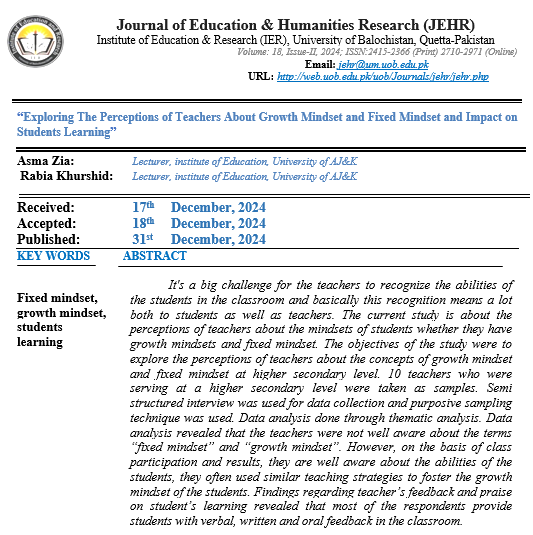Exploring The Perceptions Of Teachers About Growth Mindset And Fixed Mindset And Impact On Students Learning
Keywords:
fixed mindset, growth mindset, students learningAbstract
It's a big challenge for the teachers to recognize the abilities of the students in the classroom and basically this recognition means a lot both to students as well as teachers. The current study is about the perceptions of teachers about the mindsets of students whether they have growth mindsets and fixed mindset. The objectives of the study were to explore the perceptions of teachers about the concepts of growth mindset and fixed mindset at higher secondary level. 10 teachers who were serving at a higher secondary level were taken as samples. Semi structured interview was used for data collection and purposive sampling technique was used. Data analysis done through thematic analysis. Data analysis revealed that the teachers were not well aware about the terms “fixed mindset” and “growth mindset”. However, on the basis of class participation and results, they are well aware about the abilities of the students, they often used similar teaching strategies to foster the growth mindset of the students. Findings regarding teacher’s feedback and praise on student’s learning revealed that most of the respondents provide students with verbal, written and oral feedback in the classroom.
References
Bernard, R. (2000). Social Research Methods: Qualitative and Quantitative Approaches. Thousand Oaks, CA: Sage publications
Blackwell, L. S., Trześniewski, K. H., & Dweck, C. S. (2007). Implicit theories of intelligence predict achievement across an adolescent transition: A longitudinal study and an intervention. Child Development, 78, 246-263.
Blazer, C., & Miami--‐Dade County Public Schools, R.S. (2011). How students' beliefs about their intelligence influence their academic performance. Information capsule.Volume 10 (12). Research Services, Miami--‐Dade County Public Schools.
Crossman, A. (2018). Purposive Sampling Definition and Types – ThoughtCo
Dweck, Carol S. (2006) Mindset: The New Psychology of Success. New York: Random House
DeFranzo, E. S. (2019). What’s the difference between qualitative and quantitative research?
Dweck, C. (2007). Messages that motivate and boost achievement. Education Canada,
Dweck, C. S. (2006). Mindset: The New Psychology of Success. New York: Random House.
Dweck, C. S. (2008). The secret to raising smart kids. Scientific American Mind, 18(6), 36-43.
Dweck, C. S., & Leggett, E. L. (1988). A social-cognitive approach to motivation and personality. Psychological Review, 95(2), 256-273. http://dx.doi.org./10.1037/0033- 295X.95.2.256
Good, C., Aronson, J., & Inzlicht, M. (2003). Improving adolescents’ standardized test performance: An intervention to reduce the effects of stereotype threat. Journal of Applied Developmental Psychology, 24, 645–662.
Gerstein, Jackie. (2015) "The Educator with a Growth Mindset: A Staff Workshop." User Generated Education. https://www.edutopia.org/discussion/developing-growth-mindset-teachers-and-staff
Gundogdu, K., Silman, F. (2007). Bir meslek olarak öğretmenlik ve etkili öğretim (Teaching as a profession and effective teaching). Z. Cafoglu (Ed.) (2007). Egitim bilimine giris: Temel kavramlar el kitabı ( İntroduction to education: Handbook of basic concepts) (259-292). Ankara: Grafiker.
Harris, D. N., & Sass, T. R. (2011). Teacher training, teacher quality and student achievement. Journal of Public Economics, 95(7), 798-812. Jones, B.D., Byrd, C.N., & Lusk, D. (2009).high school students' beliefs about intelligence. Research In the Schools, 16(2), 1--‐14.
Heggart, Keith, (2015). Teacher development. Developing a growth mindset in teachers and staff.( https://www.edutopia.org/discussion/developing-growth-mindset-teachers-and-staff)
Hong, Y., Chiu, C., Dweck, C. S., Lin, D. M. S., & Wan, W. (1999). Implicit theories, attributions, and coping: A meaning system approach. Journal of Personality and Social Psychology, 77(3), 588-599. http://doi: 10.1037/0022-3514.77.3.588
https://www.researchgate.net/publication/271889744_The_Effects_of_Teachers'_Attitudes_on _Students'_Personality_and_Performance retrieved on November 1, 2018, 2018 at 11:51 AM
Marcus Guido , 2016 Teaching Strategies ,10 Ways Teachers Can Instill a Growth Mindset in Students https://www.prodigygame.com/blog/growth-mindset-in-students/ retrieved on October 31, 2018 at 9:30 PM
Mindset in the Classroom a National Study of K-12 Teachers, (2016), retrieved from https://www.edweek.org/media/ewrc_mindsetintheclassroom_sept2016.pdf
Resnick, L. B. (1995). From aptitude to effort: A new foundation for our schools. Daedalus, 124(4), 55-62. Retrieved from introduction to qualitative research: https://www.snapsurveys.com/blog/qualitative-vs-quantitative-research/
Spring, 6-10. www.thoughtco.com/purposive-sampling-3026727
Yeager, D. S., Johnson, R., Spitzer, B. J., Trześniewski , K. H., Powers, J., & Dweck, C. S. (2014). The far-reaching effects of believing people can change: Implicit theories of personality shape stress, health, and achievement during adolescence. Journal of Personality & Social Psychology, 106, 867-884.
The importance of adopting a growth mindset in your classroom https://content.acsa.org/articles/adopting-classroom-growth-mindset
Research every teacher should know: growth mindset https://www.theguardian.com/teacher-network/2018/jan/04/research-every-teacher-should-know-growth-mindset




